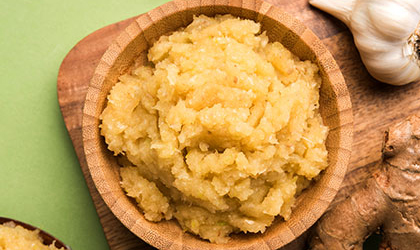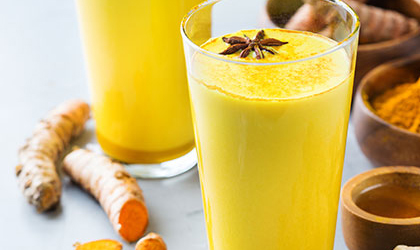
Turmeric is all the rage these days. Head to any health food shop, and you’ll see golden milk and turmeric-centric beauty products lining the shelves. Nutritionists and wellness advocates are going weak at the knees for this herb for good reason: it’s a nutritional powerhouse. Although you can add turmeric to your food (hello scrambled eggs, smoothies, salad dressings, and soups), unfortunately, most people won’t consume these foods on a regular daily basis. Sure – it’s good for wellness maintenance (not to mention adding colourful pizazz to dishes), but it just isn’t enough to unlock turmeric’s nourishing potential. Why not read our article 'Ways to Take Turmeric' to find out how to incorportate it into your diet.
The solution? A high-strength supplement. Trouble is, with so many turmeric products saturating the market, it can be hard to know where to turn. How can you be sure you’re investing in something that will deliver the potent dose of this sensational spice? To help you see the wood from the trees, we’ve distilled the ultimate turmeric supplement guide. Keep your eagle eye fixed on the following areas.
What should I look for in a turmeric supplement?
Turmeric is produced from the stems of the Curcuma Longa plant. The herb’s active ingredient, curcumin, is what gives the spice its famous golden hue and, more importantly, its extraordinary antioxidant properties. The catch-22, however, is the curcumin content of turmeric is diddlysquat – around 3% to be precise. As you can imagine, then, you need a pretty sizeable amount of curcumin present for turmeric to be relevant. As a rule of thumb: always look for products that describe themselves as ‘extracts’, with a standardised curcumin level of 95%. This way, you can be sure the supplement contains a guaranteed level as opposed to its dried culinary counterpart. The latter will contain few active compounds.
A word of warning: watch out for companies that have jumped on the turmeric bandwagon. Often, they will include negligible quantities of the spice in their nutritional formulas – just enough to get a mention on the ingredient label despite it offering little value to the user. Another red flag is products with both ‘turmeric’ and ‘curcumin’ in the title. This is a classic sign a company doesn’t have the foggiest about the differences between turmeric and curcumin – and this will, undoubtedly, shine through in the quality of their supplements.
When should I take turmeric supplements?
For all its merits, turmeric has one major drawback: it isn’t readily bioavailable. In other words, your body struggles to absorb and metabolise it, so you can’t cling on to all of its goodness (and boy, let us tell you its chock-full of goodness). That being said, there are ways you can increase its absorption. Since turmeric is fat-soluble, pairing it with fat-containing foods can support its bioavailability. This isn’t a green card to wash your turmeric supplement down with a saturated-fat-ridden fast-food milkshake – oh-no. Think healthy fats – the monounsaturated kind. With this in mind, consider taking your turmeric supplement in any of the following ways: swallow it after your oil-based omega-3 essential fatty acid supplement; chase it with a glass of dairy or almond milk; or take it after your breakfast of avocado toast, porridge or yoghurt.
Be mindful of these important details when taking your turmeric supplement. If your breakfast usually comprises of a healthy fat source, then this is a convenient time for your daily dose. If, however, you’re more likely to eat this food group at lunch or dinner, simply adjust this window. There’s no doubt turmeric is the big daddy of the spice world – one that’s wholly deserving of its impressive, age-old reputation. But to get the most out of a turmeric supplement, it’s crucial you consume it correctly, otherwise its magic and marvel will remain untapped.
You Might Also Like

Olivia
Olivia Salter has always been an avid health nut. After graduating from the University of Bristol, she began working for a nutritional consultancy where she discovered her passion for all things wellness-related. There, she executed much of the company’s content marketing strategy and found her niche in health writing, publishing articles in Women’s Health, Mind Body Green, Thrive and Psychologies.
View More



